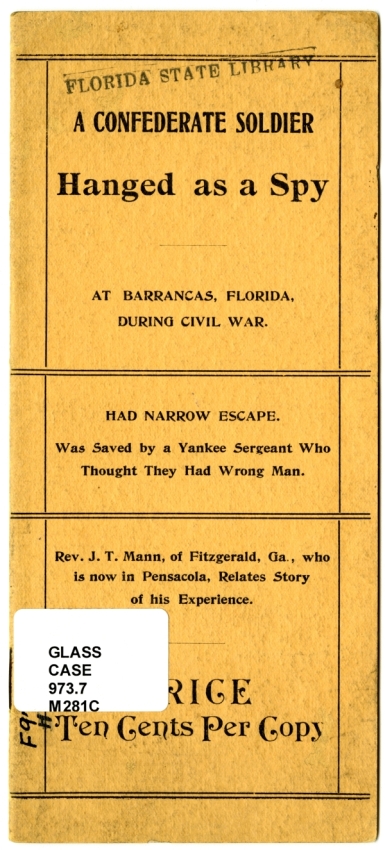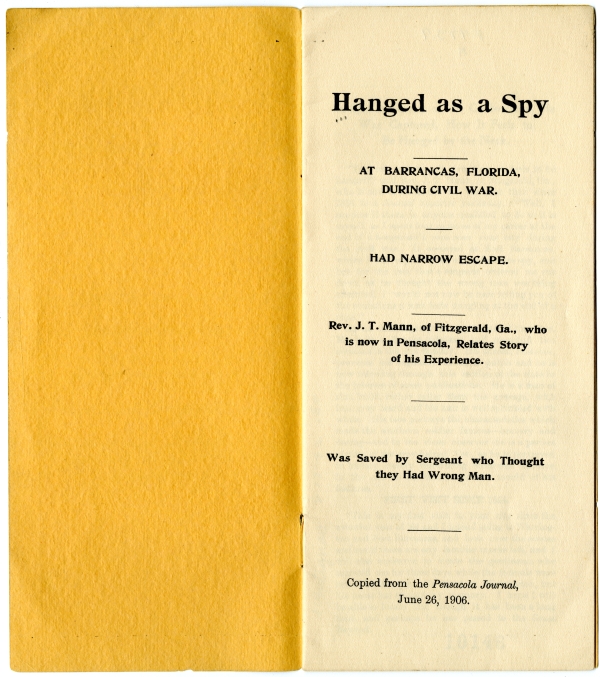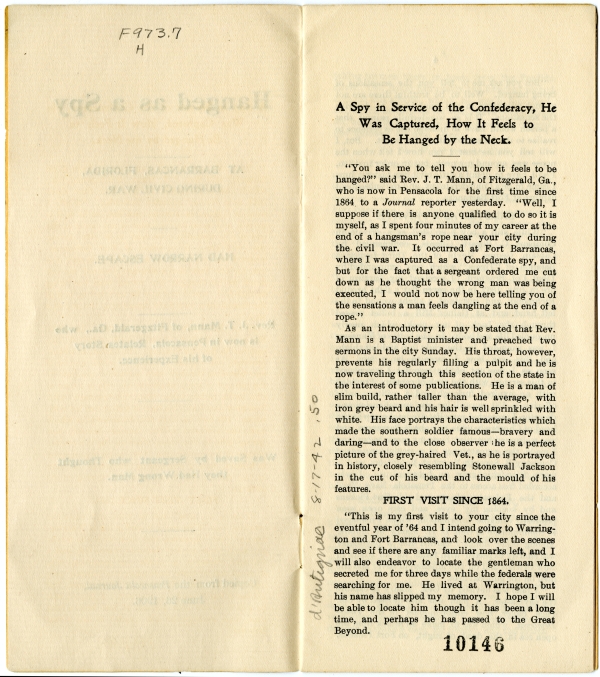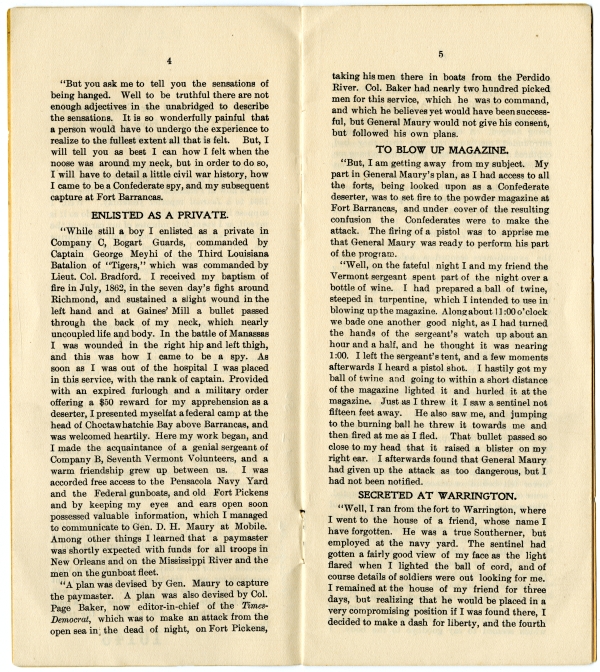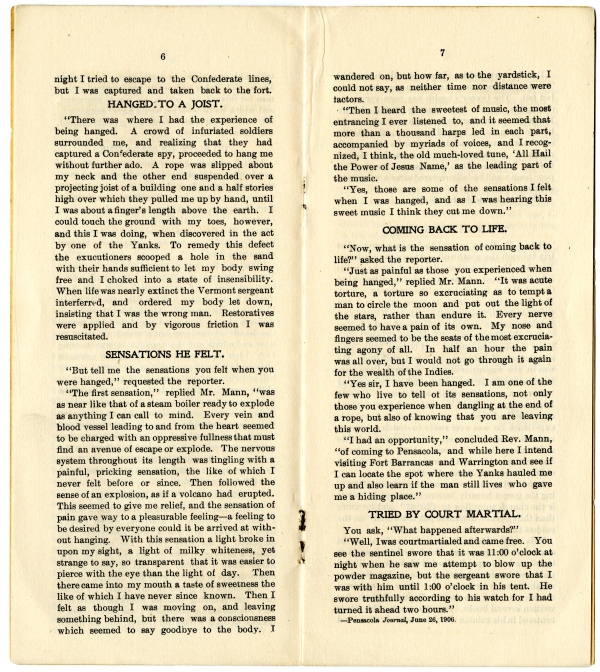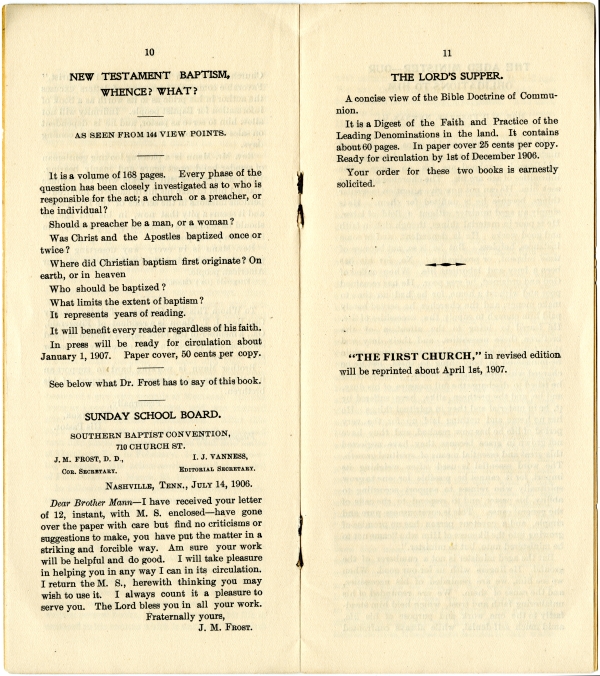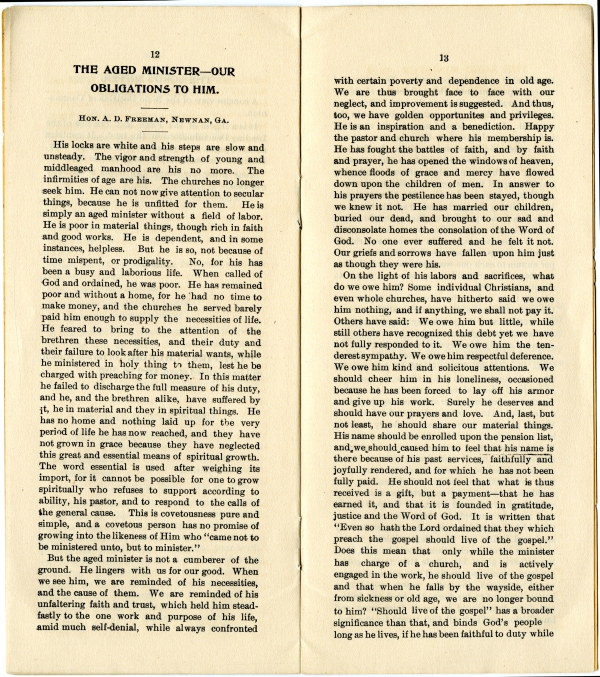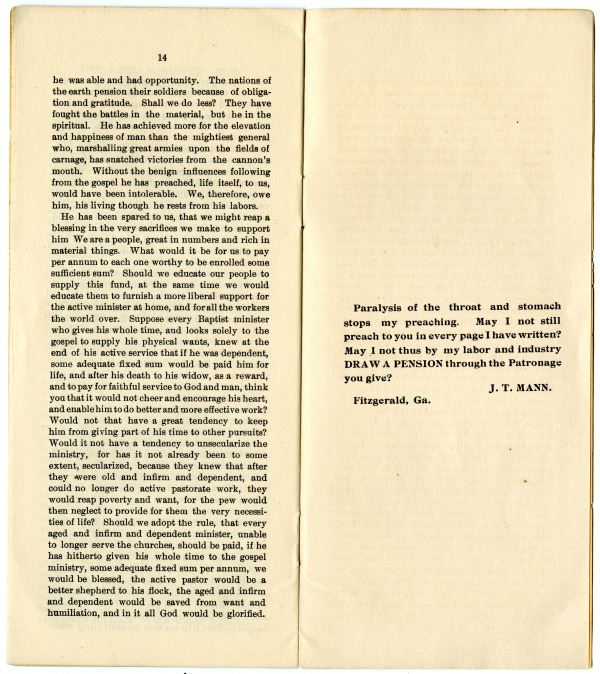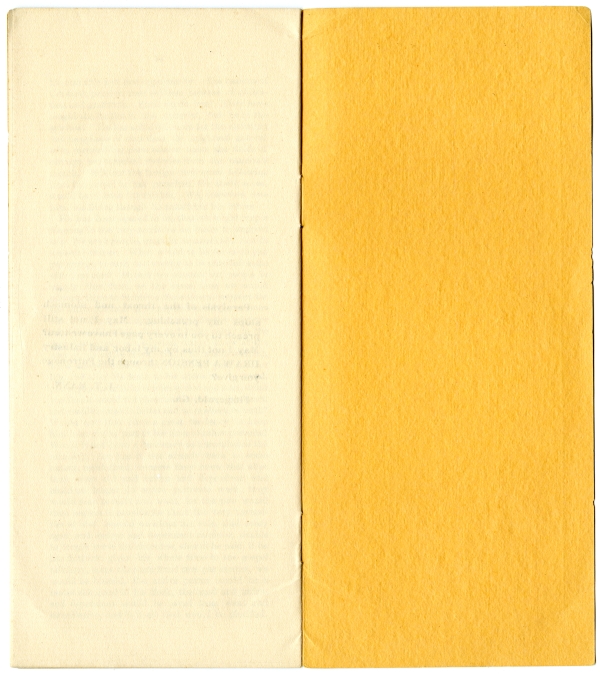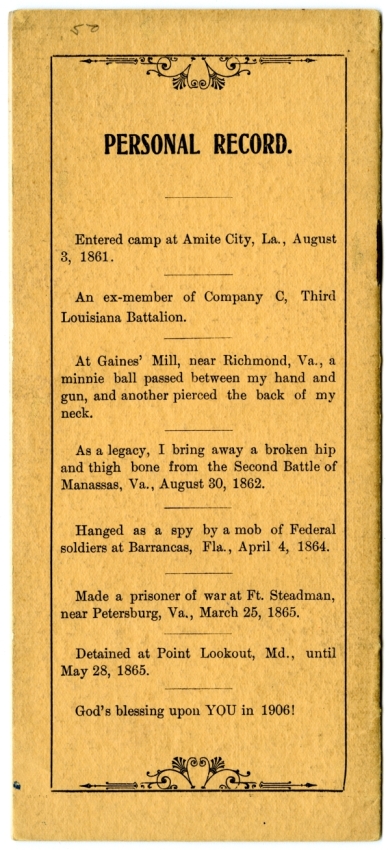Florida Memory is administered by the Florida Department of State, Division of Library and Information Services, Bureau of Archives and Records Management. The digitized records on Florida Memory come from the collections of the State Archives of Florida and the special collections of the State Library of Florida.

State Archives of Florida
- ArchivesFlorida.com
- State Archives Online Catalog
- ArchivesFlorida.com
- ArchivesFlorida.com
State Library of Florida
Related Sites
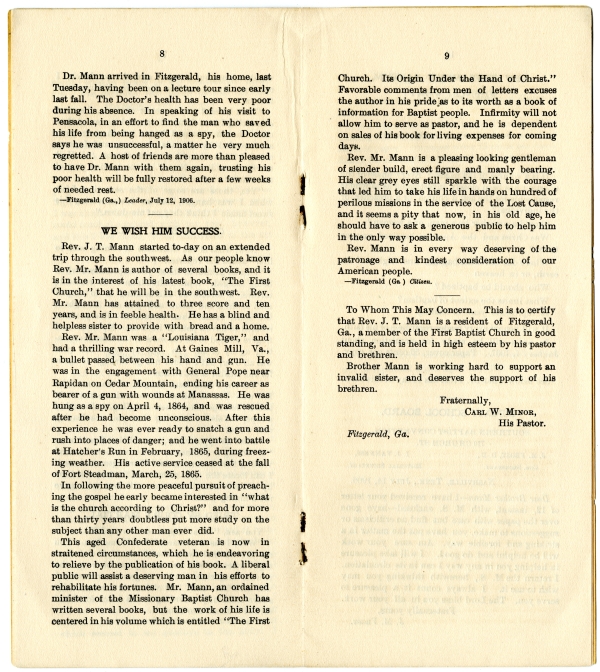
Description of previous item
Description of next item

Source
Description
Date
Creator
Format
Topic
Subjects
Geographic Term
8
Dr. Mann arrived in Fitzgerlad, his home, last Tuesday, having been on a lecture tour since early last fall. the Doctor's health has been very poor during his absence. In speaking of his visit to Pensacola, in an effort to find the man who saved his life from being haged as a spy, the Doctor says he was unsuccessful, a matter he very much regretted. A host of friends are more than pleased to have Dr. Mann with them again, trusting his poort health will be fully restored after a feww weeks of needed rest.
-Fitzgerald (Ga.,) Leader, July 12, 1906.
WE WISH HIM SUCCESS.
Rev. J. T. Martin started to-day on an extended trip through the southwest. As our people know Rev. Mr. Mann is author of several books, and it is in the interest of his latest book, "The First Church," that he will be in the southwest. Rev. Mr. Mann has attained to three score and ten eyars, and is in feeble health. he was a blind and helpless sister to provide with bread and a home.
Rev. Mr. Mann was a "Louisiana Tiger," and had a thrilling war record. At Gaines Mill, Va., a bullet passed between his hand and gun. He was in the engagement with general Pope near Rapidan on Cedar Mountain, ending his career as bearer of a gun with wounds at Manassas. He was hung as a spy on April 4, 1864, and was rescued after he had become unconscuious. After this experience he was ever ready to snatch a gun and rush into places of danger; and he went into battle at Hatcher's Run in February, 1865, during freezing weather. His active service ceased at the fall of Fort Steadman, March, 25, 1865.
In following the more peaceful puyrsuit of preaching the gospel he early became interested in "what is the church according to Christ?" and for more than thirty years doubtless put more study on the subject than other man ever did.
This aged Confederate veteran is now in straitened circumstances, which he is endeavoring to relieve by the publication of his book. A liberal public will assist a deserving man in his efforts to rehabilitate his fortunes. Mr. Mann, an ordained minister of the Missionary Baptist Church has written severla books, ut the work of his life is centered in volume which is entitled "The First Church. Its Origin Under the Hand of Christ." Favorable comments from men of letters excuses the author in his pride as to its worth as a book of information for Baptist people. Infirmit will not allow him to serve as pastor, and he is dependent on sales of his book for living expenses for coming days. Rev. Mr. Mann is a pleasing looking gentleman of slender build, erect figure and manly bearing. His clear grey eyes still sparkle with the courage that led him to take his life in hands on hundred of perilous missions in the service of the Lost Cause, and it seems a pity that now, in his old age, he should have to ask a generous public to help him in the only way possible. Rev. Mann is in every way deserving of the patronage and kindest consideration of our American people.
-Fitzgerald (Ga) Citizen.
To Whom This May Concern. This is to certify that Rev. J.T. Mann is a resident of Fitzgerald, Ga., a member of the First Baptist Church in good standing, and is held in high esteem by his pastor and brethren.
Brother Mann is working hard to support and invalid sister, and deserves the spport of his brethern.
Fraternally,
CARL W. MINOR,
His Pastor.
Fitzgerald, Ga.
Title
Subject
Description
Creator
Source
Date
Format
Language
Type
Identifier
Coverage
Geographic Term
Thumbnail
ImageID
topic
Subject - Person
Transcript
A CONFEDERATE SOLDIER
Hanged as a Spy
AT BARRANCAS, FLORIDA,
DURING CIVIL WAR.
HAD NARROW ESCAPE.
Was Saved by a Yankee Sergeant Who thought They Had Wrong Man.
Rev. J.T. Mann, of Fitzgerald, Ga., who is now in Pensavola, Relates Story of his Experiece.
PRICE
Ten Centers Per Copy
Hanged as a Spy
AT BARRANCAS, FLORIDA, DURING CIVIL WAR.
HAD NARROW ESCAPE.
Rev. J.T. Mann, of Fitzgerald, Ga., who is now in Pensacola, Relates Story of his Experience.
Was Saved by Sergeant who Thought they Had Wrong Man.
Copied from the Pensacola Journal, June 26, 1906.
A Spy in Service fo the Confederacy, He Was Captured, How It Feels to Be Hanged by the Neck.
"You ask me to tell you hot it feels to be hanged?" said Rev. J. T. Mann, of Fitzgerald, Ga., who is now in Pensacola for the first time since 1864 to a Journal reporter yesteday. "Well, I suppose if there is anyone qualified to do so it is myself, as I spent four minutes of my career at the end of a hangsman's rope near your city during the civil war. It occured at Fort Barrancas, where I was captured as a Confederate spy, and but for the fact that a sergeant ordered me cut down as he though the wrong man was being executed, I would not now be here telling you of the sensations a man feels dangling at the end of a rope."
As an introductory it may be stated that Rev. Mann is a Baptist minister and preached two sermons in the city Sunday. His throat, however, prevents his regularly filling a pulpit and he is now traveling through this section of the state in the interest of some publications. He is a man of slim build, rather taller than the average, with iron grey beard and his hair is well sprinkled with white. His face portrays the characteristics which made the southern soldier famous- bravery and daring- and to the close observer he is a perfect picture of the grey-haired. Vet., as he is portrayed in history, closely resembling Stonewall Jackson in the cut of his beard and the mould of his features.
FIRST VISIT SINCE 1864.
"This is my first visit to your city since the eventful year of '64 and I intend going to Warrington and Fort Barrancas, and look over the scenes and see if there are any familiar marks left, and I will also endeavor to locate the gentleman who secreted me for three days while the federals were searching for me. He lived at Warrington, but his name has slipped my memory. I hope I will be able to locate him though it has been a long time, and perhaps he has passed to the Great Beyond.
4
"But you ask me to tell you the sensations of being hanged. Well to be truthful there are not enough adjectives in the unabridged to describe the sensations. It is so wonderfully painful that a person would have to undergo the experience to realize to the fullest extent all that is felt. But, I will tell you as best I can how I felt when the noose was around my neck, but in order to do so, I will have to detail a little civil war history, how I came to be a Confederate spy, and my subsewuent capture at Fort Barrancas.
ENLISTED AS A PRIVATE.
"While still a boy I enlisted as a private in Company C, Bogart Guards, commanded by Captain George Meyhi of the Third Louisiana Batalion of "Tigers," which was commanded by Lieut. Col. Bradford. I received my Baptism of fire in July, 1862, in the seven day's fight around Richmond, and sustained a slight wound in the left hand at ant Gaines' Mill a bullet passed through the back of my neck, which nearly uncoupled life and body. In the battle of Manassas I was wounded in the right hip and left thigh, and this was how I came to be a spy. As soon as I was out of the hospital I was placed in this service, with the rank of captain. provided with an expired furlought and a military order offering a $50 reward for my apprehension as a deserter, I presented myself at a federal camp at the head of Choctawhatchie Bay above Barrancas, and was welcomed heartily. Here my work began, and I made the acquantaince of a genial sergeant of Company B, Seventh Vermont Volunteers, and a warm friendship grew up between us. I was accorded free access to the Pensacola Navy Yard and the gederal gunboats, and old Fort Pickens and by keeping my eyes and ears open soon possessed valuable information, which I managed to communicate to gen. D. H. Maury at Movile. Among other things I learned that a paymaster was shortly expected with funds for all troups in New Orleans and on the Mississippi River and the men on the gunboat fleet.
"A plan was devised by Gen. Maury to capture the paymaster. A plan was also devised by col. Page baker, now editor-in-chief of the Times-Democrat, which was to make an attack from the open sea in the dead of night, on Fort Pickens,
5
taking his men there in boats from the Perdido River. Col. Baker had nearly two hundred picked men for this service, which he was to command, and which he believes yet would have been successful, but General Maury would not give his consent, but followed his own plans.
TO BLOW UP MAGAZINE.
"But, I am getting way from my subject. My part in General Maury's plan, as I had access to all the forts, being looked upon as a Confederate deserter, was to set fire to the powder magazine at Fort Barrancas, and under cover of the resulting confusion the Congederates were to make the attack. The firing of a paistol was to apprise me that General Maury was ready to perform his part of the program.
"Well, on the fateful night I and my friend the Vermont Sergeant spent part of the night over a bottle of wine. I ahd prepared a ball of twine, steeped in turpentine, which I intended to use in blowing up the magazine. along about 11:00 o'clock we bade one another good night, as I had turned the hands of the sergeant's watch up about an hour and a half, and he thought it was nearing 1:00. I left the sergeant's tent, and a few moments afterwards I heard a pistol shot. I hastily got my ball of twin and going to within a short distance of the magazine lighted it and hurled it at the magazine. Just as I threw it I saw a sentinel not fifteen feet way. He also saw me, and jumping to the burning ball he threw it towards me and then fired at me as I fled. That bullet passed so close to my head that it raised a blister on my right ear. I afterwards found the General Maury had given up the attack as too dangerous, but I had not been notified.
SECRETED AT WARRINGTON.
"Well, I ran from the fort to Warrington, where I went to the house of a friend, whose name I have forgotten. He was a true Southerner, but employed at the navy yard. The sentinel had gotten a fairly good view of my face as the light flared when I lighted the ball of cord, and of course details of soldiers were out looking for me. I remained at the house of my friend for three days, but realizing that he would be palced in a very compromising position if I was found there, i decided to make a dash for liberty, and the fourth
6
night I tried to escape to the Confederate lines, but I was captured and taken back to the fort.
HANGED TO A JOIST.
"There was where I had the experience of being hanged. A crowd of infuriated soldiers surrounded me, and realzing that they had captured a Confederate spy, proceeded to hang me without further ado. A rope was slipped about my neck and the other suspended over a porjecting joist and a building one and a half stores high over which they pulled me up by hand, until I was about a finger's length above the earth. I could touch the ground with my toes, however, and this I was doing, when discovered in the act by one of the Yanks. To remedy this defect the excecutioners scooped a hole in the sand with their hands sufficient to let my body swing free and I chocked into a state of insensibility. When life was nearly extinct the Vermont seargeant interferred, and ordered my body let down, insisting that I was the wrong ma. Restoratives were applied and by vigorous friction I was resuscitated.
SENSATIONS HE FELT.
"But tell me the sensations you felt when you were hanged," requested the reporter.
"The first sensation," replied Mr. Mann, "was as near like that of a steam boiler ready to explode as anything I can call to mind. Every vein and blood vessel leading to and from the heart seemed to be charged with an oppressive fulness that must find an avenue of escape or explode. The nervous system throughout its length was tingling with a painful, pricking sensation, the like of which I never felt before or since. Then followed the sense of an explosion, as if a volcano had erupted. This seemed to give me relief, and the sensation of pain gave way to a pleasurable feeling- a feeling to be desired by everyone could it be arrived without handing. With this sensation a light broke in upong my sight, a light of milky whiteness, yet strange to say, so transparent that it was easier to pierce with the eye than the light of day. Then there came into my mouth a taste of sweetness the like of which I have never since known. Then I felt as though I was moving on, and leaving something behind, but there was a consciousness which seemed to say goodbye to the body. I
7
wandered on, but how far, as to the yardstick, I could not say, as neither time nor distance were factors.
"Then I heard the sweetest music, the most entrancing I ever listened to, and it seemed more than a thousand harps led in each part, accompanied by myriads of voices, and I recognized, I think, the old much-loved tun, "All Hail the Power of Jesus Name," as the leading part of the music.
"Yes, those are some of the sensations I felt when I was hanged, and as I was hearing this sweet music I think they cut me down."
COMING BACK TO LIFE.
"Now, what is the sensation of coming back to life?" askled the reporter.
"Just as painful as those you experienced when being hanged," replied Mr. Mann. "It was acute torture, a torture so excruciating as to tempt a man to circle the moon and put out the light of the stars, rather than endure it. Every never seemed to have a pain of its own. My nose and fingers seemed to be the seats of the most excruciating agony of all. In half an hour the pain was all over, but I would not go through it again for the wealth of the Indies.
"Yes sir, I have been hanged. I am one of the few who live to tell of its sensations, not only those you experience when dangling at the end of a rope, but also of knowing that you are leaving this world."
"I had an opportunity," concluded Rev. Mann, "of coming to Pensacola, and while here I intend visiting Fort Barrancas and Warrington and see if I can locate the spot where the Yanks hauled me up and also learn if the man still lives who gave me a hiding place."
TRIED BY COURT MARTIAL.
You ask, "What happened afterwards?"
"Well, I was courmartialed and came free. You see the sentinel swore that it was 11:00 o'clocl at night when he saw me attempt to blow up the powder magazie, but the sergeant swore that I was with him until 1:00 o'clock in his tent. He swore truthfully according to his watch for I had turned it ahead two hours."
-Pensacola, Journal, June 26, 1906.
8
Dr. Mann arrived in Fitzgerlad, his home, last Tuesday, having been on a lecture tour since early last fall. the Doctor's health has been very poor during his absence. In speaking of his visit to Pensacola, in an effort to find the man who saved his life from being haged as a spy, the Doctor says he was unsuccessful, a matter he very much regretted. A host of friends are more than pleased to have Dr. Mann with them again, trusting his poort health will be fully restored after a feww weeks of needed rest.
-Fitzgerald (Ga.,) Leader, July 12, 1906.
WE WISH HIM SUCCESS.
Rev. J. T. Martin started to-day on an extended trip through the southwest. As our people know Rev. Mr. Mann is author of several books, and it is in the interest of his latest book, "The First Church," that he will be in the southwest. Rev. Mr. Mann has attained to three score and ten eyars, and is in feeble health. he was a blind and helpless sister to provide with bread and a home.
Rev. Mr. Mann was a "Louisiana Tiger," and had a thrilling war record. At Gaines Mill, Va., a bullet passed between his hand and gun. He was in the engagement with general Pope near Rapidan on Cedar Mountain, ending his career as bearer of a gun with wounds at Manassas. He was hung as a spy on April 4, 1864, and was rescued after he had become unconscuious. After this experience he was ever ready to snatch a gun and rush into places of danger; and he went into battle at Hatcher's Run in February, 1865, during freezing weather. His active service ceased at the fall of Fort Steadman, March, 25, 1865.
In following the more peaceful puyrsuit of preaching the gospel he early became interested in "what is the church according to Christ?" and for more than thirty years doubtless put more study on the subject than other man ever did.
This aged Confederate veteran is now in straitened circumstances, which he is endeavoring to relieve by the publication of his book. A liberal public will assist a deserving man in his efforts to rehabilitate his fortunes. Mr. Mann, an ordained minister of the Missionary Baptist Church has written severla books, ut the work of his life is centered in volume which is entitled "The First Church. Its Origin Under the Hand of Christ." Favorable comments from men of letters excuses the author in his pride as to its worth as a book of information for Baptist people. Infirmit will not allow him to serve as pastor, and he is dependent on sales of his book for living expenses for coming days. Rev. Mr. Mann is a pleasing looking gentleman of slender build, erect figure and manly bearing. His clear grey eyes still sparkle with the courage that led him to take his life in hands on hundred of perilous missions in the service of the Lost Cause, and it seems a pity that now, in his old age, he should have to ask a generous public to help him in the only way possible. Rev. Mann is in every way deserving of the patronage and kindest consideration of our American people.
-Fitzgerald (Ga) Citizen.
To Whom This May Concern. This is to certify that Rev. J.T. Mann is a resident of Fitzgerald, Ga., a member of the First Baptist Church in good standing, and is held in high esteem by his pastor and brethren.
Brother Mann is working hard to support and invalid sister, and deserves the spport of his brethern.
Fraternally,
CARL W. MINOR,
His Pastor.
Fitzgerald, Ga.
10
NEW TESTAMENT BAPTISM,
WHENCE? WHAT?
AS SEEN FROM 144 VIEW POINTS.
It is a volume of 168 pages. Every phase of the question has been closely investigated as to who is responsible for the act; a church or a preacher, or the individual?
Should a preacher be a man, or a woman?
Was Christ and the Apostles baptized once or twice?
Where did Christian baptism first originate? On earth, or in heaven
Who should be baptized?
What limits the extend of baptism?
it represents years of reading.
It will benegit every reader regardless of his faith.
In press will be ready for circulation about January 1, 1907. Paper cover, 50 cents per copy.
See below what Dr. Frost has to say of this book.
SUNDAY SCHOOL BOARD.
SOUTHERN BAPTIST CONVENTION, 710 CHURCH ST.
J.M. FROST, D. D., COR. SECRETARY.
I. J. VANNESS, EDITORIAL SECRETARY.
NASHVILLE, TENN., JULY 14, 1906.
Dear Brother Mann- I have received your letter of 12, instant, with M.S. enclosed- have gone over the paper with care but find no criticims or suggestions to make, you have put the matter in a striking and forcible way. Am sure your work will be helpful and do good. I will take pleasure in helping you in any way I can in its circulation. I return the M.S., herewith thinking you may wish to use it. I always count it a pleasure to serve you. The Lord bless you in all your work.
Fraternally yours,
J.M. FROST.
11
THE LORD'S SUPPER.
A concise view of the Bible Doctrine of Communion.
It is a Digest of the Faith and Practice of the Leading Denominations in the land. It contains about 60 pages. In paper cover 25 cents per copy. Ready for circulation by 1st of December 1906.
Your order for these two books is earnestly solicited.
"THE FIRST CHURCH," in revised edition will be reprinted about April 1st, 1907.
12
THE AGED MINISTER - OUR OBLIGATIONS TO HIM.
HON. A. D. FREEMAN, NEWNAN, GA.
His locks are white and his steps are slow and unsteady. The vigor and strength of young and middleaged manhood are his no more. The infirmities of age are his. the churches no longer seek him. he can not now give attention to secular things, because his is unfitted for them. He is simply an aged minister without a field of labor. He is poor in material things, through rich in faith and good works. He is dependent, and in some instances, helpless. But he is so, not because of time mispent, or prodigality. No, for his has been a busy and laborious life. When called of God and ordained, he was poor. He was remained poor and without a home, for he had not time to make money, and the churches he served barely paid him enough to supply the necessities of life. He feared to bring to the attention of the brethren these necessities, and their duty and their failure to look after his material wants, while he ministered in holy thing to them, lest he be charged with preaching for money. In this matter he failed to discharge the full measure of his duty, and he, and the brethren alike, have suffered by it, he in material and they in spiritual things. he has no home and nothing laid up for the very period of life he has now reached, and they ahve not grown in grace because they have neglected this great and essential is used after weighing its import, for it cannot be possible for one to grow spiritually who refuses to support according to ability, his poastor, and to respond to the calls of the general cause. This is covetousness pure and simple, and a covetous person has no promiose of growing into the likeness of Him who "came not to be ministered unto, but to minister."
But aged minister is not a cumberer of the ground. He lingers with us for our good. When we see him, we are reminded of his necessities, and the cause of them. We are reminded of his unfaltering faith and trust, which held him steadfastly to the one work and purpose of his life, amid much self-denial, while always confronted
13
with certain poverty and dependence in old age. We are thus brought face to face with our neglect, and improvement is suggested. And thus, too, we have golden opportunities and privileges. he is an inspiration and a benediction. Happy the pastor and church where his membership is. He has fought the battles of faith, and by faith and prayer, he has opened the windows of heaven, whence floods of grace and mercy have flowed down upon the children of men. In answer to his prayers the pestielnce has been stayed, though we knew it not. He has married our children, buried our dead, and brought to our sad and disconsolate homes the consolation of the Word of God. No one ever suffered and he felt it not. Our griefs and sorrows have fallen upon him just as though they were his.
On the light of his labors and sacrifieces, what do we owe him? Some individual Christians, and even whole churches, have hitherto said we owe him nothing, and if anything, we shall not pay it. Others have said We own him but little, while still others have recognized this debt yet we have not fully responded to it. We owe him the tenderest sympathy. We owe him respectful deference. We owe him kind and solicitious attentions. We should cheer in his loneliness, occasioned because he has been forced to lay off his armor and give up his work. Surely he deserces and should have our prayers and love. And, last, but not least, he should share our material things. His name should be enrolled upon the pension list, and we should caused him to feel that his name is there because of his past services, faithfully and joyfully rendered, and for which he has not been fully paid. He should not feel that what is thus received is a gift, but a payment - that he has earned it, and that it is founded in gratitude, justive and the Word of God. it is written that "Even so hath the Lord ordained that they which preach the gospel should live off the gospel." Does this mean that only while the minister has charge of a church and is actively engaged in the work, he should live of the gospel and that when he falls by the wayside, either from sickness or old age, we are no longer bound to him? "Should live of the gospel" has a broader significance than that, and binds God's people long as he lives, if he has been faithful to duty while
14
he was able and had opportunity. The nations of the earth pension their soldiers because of oligations and gratitude. Shall we do less? they have fought the battles in the material, but he in the spiritual. He has achieved more for the elevation and happiness of man than the mightiest general who, marshalling great armies upon the fields of carnage, has snatched victories from the cannon's mouth. Without the benign infliences following from the gospel he has preached, life itself, to us, would have been intolerable. We, therefore, owe him, his living through he rests fro his labors.
He has been spared to us, that we might reap a blessing in the very sacrifices we make to support him. We are a people, great in numbers and rich in materials things. What would it be for us to pay per annum to each one worthy to be enrolled some sufficient sum? Should we educate our people to supply this fund, at the same time we should educate them to furnish a more liberal support the active minister at home, and for all the workers the world over. Suppose every Baptist minister who gives his whole time, and looks solely to the gospel to supply his physical wants, knew at the end of his active service that if he was dependent, some adequate fixed sum would be paid him for life, and after his death to his widow, as a reward, and to pay for faithful service to God and man, think you that it would not cheer and encourage his ehart, and enable him to do better and more effective work? Would not that have a great tendency to keep him from giving part of his time to other pursuits? Would it not have a tendency to unsecularize the ministry, for has it not already been to some extent, secularized, because they knew that after they were old and infirm and dependent, and could no longer do active pastorate work, they would reap poverty and want, for the pew would then neglect to provide for them the very necessities of life? Should we adopt the rule, that every aged and infirm and dependent minister, unable to longer serve the churches, should be paid, if he has hitherto given his whole time to the gospel ministery, some adequate fixed sum per annum, we would be blessed, the active pastor would be a better shepherd to his flock, the aged and infirm and dependent would be saved from want and humiliation, and in it all God would be glorified.
Paralysis of the throat and stomach stops my preaching. May I not still preach to you in every page I have written? May I not thus by labor and industry DRAW A PENSION through the Patronage you give?
J.T. MANN
Fitzgerald, Ga.
PERSONAL RECORD.
Entered campt at Amite City, La., August 3, 1861.
An ex-member of Company C, Third Louisiana Battalion.
At Gaines' Mill, near Richmond, Va., a minnie ball passed between my hand and gun, and nother pierced the back of my neck.
As a legacy, I bring away a broken hip and thigh bone from the Second Battle of Manassas, Va., august 30, 1862.
Hanged as a spy by a mob of Federal soldiers at Barrancas, Fla., April 4, 1864.
Made a prisoner of war at Ft. Steadman, near Petersburg, Va., March 25, 1865.
Detained at Point Lookout, Md., until May 28, 1865.
God's blessing upon YOU in 1906!
Chicago Manual of Style
Pensacola Journal. A Confederate Soldier Hanged as a Spy, pamphlet. 1906. State Archives of Florida, Florida Memory. <https://www.floridamemory.com/items/show/326637>, accessed 13 February 2026.
MLA
Pensacola Journal. A Confederate Soldier Hanged as a Spy, pamphlet. 1906. State Archives of Florida, Florida Memory. Accessed 13 Feb. 2026.<https://www.floridamemory.com/items/show/326637>
AP Style Photo Citation
(State Archives of Florida/Pensacola Journal)

 Listen: The Folk Program
Listen: The Folk Program